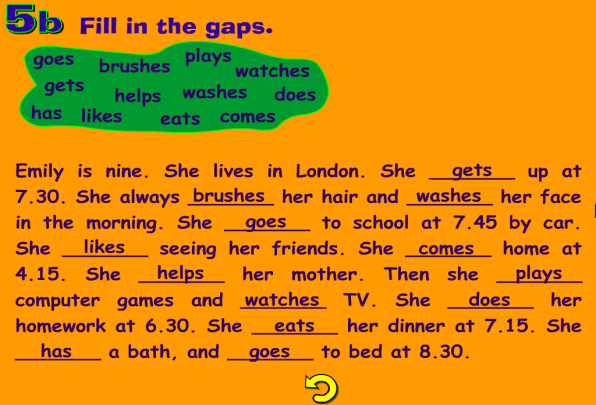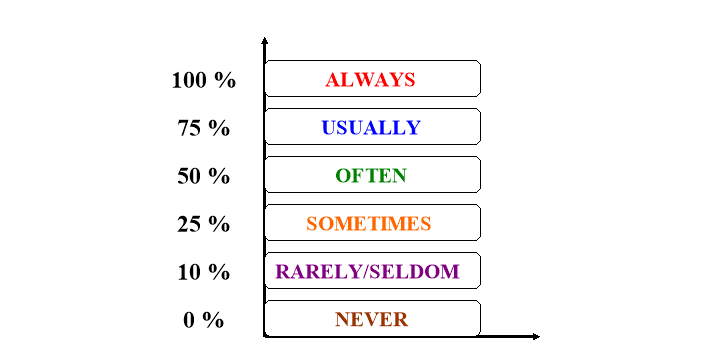«Save your time. Daily routine»
Розробка уроку з англiйськоi мови в 5 кл.
«Save your time. Daily routine»
Цiлi уроку:
Практична: систематизувати i удосконалювати знання за темою « Time. Daily routine. Present Simple Tense. Adverbs of frequency. »; розвивати навички аудювання, говорння, читання та письма.
Освiтня: формувати уявлення учнiв про теперешнй простий час, вживаючи прислiвники частотностi.
Розвиваюча: розвивати мислення, пам’ять та увагу; розвивати комунiкативнi здiбностi.
Виховна: виховувати бажання дiтей бережно ставитись до свого часу i плнувати свiй рабочий день; виховувати етику взаэмовiдношень.
Обладнення: пiдручник CLICK ON I, дошка, аудiозапаиси, мультемедiйний проектор, екран, таблицi, картки, роздавальний матерiал.
Хiд уроку:
- Введення в урок.
- Привiтання.
T: Good morning, dear children!
P: Good morning, teacher!
T: Sit down, please! I’m glad to see you! I hope you are ready for our lesson and are in good mood.
T: What’s the time now?
P: It’s ten minutes to nine.
T: It’s time to start our lesson. What’s the date today?
P: Today is the twenty third of March.
T: What day of the week is today?
P: Today is Tuesday.
T: What season is it now?
P: Now is spring.
T: Do you like spring?
P: Yes, we do.
T: Say, please, why you like this season of the year!
P: Because we like a good weather. We enjoy playing outdoors.
- Мовленева зарядка i повiдомлення теми уроку.
T: You are right, it’s great fun to spend time outdoors in spring. But as one proverb goes: “Every day is not Sunday”, so we should also work and “shouldn’t waste time, because it flies”, as another proverb says. Let’s read and translate these proverbs and some other ones in such a way: I begin reading the proverb and you all together continue it.
(children read and translate the proverbs)
- “Every day is not Sunday” – “Не кожен день недiля/ вихiдний”;
- “Don’t waste time, it flies” – “Не гайте часу, вiн летить”;
- “We cannot put back the clock” – “Не можливо перевести годинник назад”;
- “Lost time is never found again” – “Втрачений час нiколи не вернеш”.
T: I think you understand that today our lesson is devoted to time. Today we are going to speak about our daily routine, as well as about our leisure time, using adverbs of frequency and telling the time.
The theme of the lesson is “Save your time”.
Answer, please, my question: “Why should we save time?”
(Children answer, using the proverbs)
T: What helps us to save time? To answer this question, guess the riddle: “What has got two/ three hands and one face, but no arms and legs?” (a clock).
- Основна частина уроку
- Переврка домашнього завдання.
T: What was your homework for today?
P: Our homework for today was to draw the clock and the hands that show the time and write the time..
T: Show me how you have done the task, show your clocks.
Look at the screen and check if you are correct ( a table and a clock).
|
1. 12:30 |
|
|
1. P: It’s half past one. |
|
2. 19:45 |
|
|
2. P: It’s a quarter to eight. |
|
3. 15:10 |
|
|
3. P: It’s ten minutes past three. |
|
4. 18:55 |
|
|
4. P: It’s five minutes to seven. |
- Закрiплення вживання часу в мовленнi.
T: During our working day we always use a watch and a clock to be on time. That’s why let’s train to tell the time in English.
1). Look at the screen, tell the time. (Presentation).
2). Listen and draw the time (the hands of the clock). Ex. 7 p. 56.
3). Look at the clock and write down the time. (Presentation)
- Розпорядок дня.
Speaking
1). Match the pictures to the phrases written on your sheets of paper. (Sheet of paper, presentation)
2). Number the activities in the correct order. (Sheet of paper)
- Have a shower 13
- brush teeth 3
- arrive home 10
- have breakfast 5
- get up 1
- go to school 7
- have dinner 12
- get dressed 6
- have lunch 9
- wash the face 2
- go to bed 14
- do homework 11
- study 8
- make the bed 4
T: Check it, looking at the screen.
T: Speak about your working day, using the pictures and given expressions.
(Children speak about their daily routine)
4. Writing and reading.
T: Now, let’s read about a working day of Laura, one girl, who lives in London. But before it, say, please how we form the Present Simple in the third person singular.
P: We form the Present Simple in the third person singular wit the help of adding -s to the verb.
T: Now open your copy-books and we’ll train to use the Present Simple in the third person singular. Look at the blackboard. Will you complete the sentences, please.
|
A GOOD BOY (a smiley face) |
A BAD BOY (a sad face) |
|
1. I get up at 7 o’clock. |
1. I don’t get up at 7 o’clock. |
(Children write on the blackboard and in their copy-books)
T: So, read the text individually and fill in the verbs in the appropriate form.
|
Fill in the verbs.
Go get have watch help play Like wash come eat do brush |
|
Laura is nine. She lives in London. She __________ up at 7:30. She always __________ her teeth and __________ her face in the morning. She __________ to school at 7:45 by car. Laura __________ meeting her friends. She _________ home at 4:15. The girl _________ her mother. Then she _________ computer games and ____________ TV. She __________ her homework at 6:30. She __________ her dinner at 7:15. Then Laura _________ a bath, and _________ to bed at 8:30.
|
T: Now look at the screen and check yourselves.

T: Has everybody checked? Is everything correct? Ok, very well, children. Now, please read and translate the text.
(Children read and translate the text)
5. Listening.
T: Thank you for your reading and translating. You see, Laura, as well as we, has not only working days, but also weekends. Do you remember the proverb “Every day is not Sunday”? Translate it. But nevertheless we have Sunday and Saturday too. Your task will be to listen to the dialogue and get to know about Laura’s activities at the weekend. But before it, let’s revise the adverbs of frequency, for later to understand how often she does this or that activity. What is it “adverb of frequency”? Translate it into Ukrainian.
P: Прислiвники частотностi.
T: What does it mean? What does an adverb of frequency show?
P: It shows how often we do this or that activity.
T: I want to offer you a diagram and adverbs of frequency and you should move the adverbs of frequency to the correct place and translate them.
![]()
![]()
![]()
![]()
![]()
![]()

(Children move the cards with adverbs of frequency to the correct place)

T: Now listen to the dialogue and on your sheets of paper tick how often Laura does this or that activity.
|
Tick how often she does this or that activity |
NEVER |
RARELY |
SOMETIMES |
OFTEN |
USUALLY |
ALWAYS |
|
Go climbing |
|
|
|
|
|
|
|
Wash the car |
|
|
|
|
|
|
|
Go to the gym |
|
|
|
|
|
|
|
Cook |
|
|
|
|
|
|
|
Go on a picnic |
|
|
|
|
|
|
|
Go dancing |
|
|
|
|
|
|
T: Let’s check it up, speaking about Laura’s weekend in pairs. But before it, say, please, where we should place the adverbs of frequency in the sentence.
P: We place the adverbs of frequency before verbs.
T: Ask and answer the questions about Laura’s weekend activities as in the example.
- Заключна частина уроку
1. Домашнє завдання:
T: Write down your home task. You are to write about Laura’s weekend.
2. Підведення підсумків уроку
T: We have done a lot of work during our lesson, and I’m very satisfied with your work. Thank you for your good preparing. The lesson is over. Good bye, children!


про публікацію авторської розробки
Додати розробку
